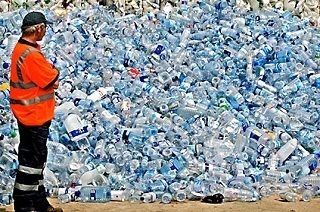From Guest Blogger Izzie: Which Source of Drinking Water Is Best for the Environment?

Today we’ll turn our focus on a more narrow water topic. We’re not thinking of the big picture here, but small scale – namely, what is the best method of drinking water when it comes to all things eco-friendly. As it is so abundant, you may think that drinking water is eco-friendly by default. Unfortunately, this isn’t true. However, there are plenty of ways to be responsible in your water consumption.
Don’t buy bottled water
Society as a whole needs to grasp that bottled water, in most countries, is pointless and harmful. While we won’t deny its usefulness in third world countries, or in countries with unsafe drinking water, in most first world countries the industry is usually nothing but bad news for the environment.
While the water may be sourced from some amazing natural spring, the plastic bottle it comes in uses up material unnecessarily. They are part of the disposable culture that causes a lot of damage, and even with recycling efforts getting bigger and better every year, they are still thrown away by the millions every single day.
But let’s say your hands are tied, and bottled water is your only option, what can you do? Well, there are some ways to be eco-conscious even in this harmful sector. Seek out:
- Big bottles. Buying tiny bottles is only good for transport convenience. You are causing less damage buy purchasing large bottles with a lot of water than constantly buying little bottles.
- Recycled bottles. Bottled water companies are all too aware of the groundswell of resistance against them, so they have made efforts to appear more eco friendly. Chief among these efforts is their push to make their bottles from a percentage of recycled material.
- Bottles that are sourced locally. Getting water from the Alps may seem refreshing, but the additional eco-footprint of its transport is too high a price. The closer the source of the water to the location you are buying it from, the better.
Buy a recycled bottle
So if bottled water is off the table, what are the alternatives. Thankfully, some companies have taken the initiative and made much better alternatives to inherently disposable bottles. A quick search online will help you find tons of hard plastic bottles, designed to be as eco-friendly as possible and incredibly durable. While they still have an impact, they can be used again and again for years, which can help just as much to reduce your eco-impact.
If you want one for travel, for the office, or even for exercise, you’ll be able to find one. The OKO, for example, is a fitness hard plastic bottle with a built in water filtration system so powerful it can filter cola down to water! Eco-bottles needn’t be basic or ineffective in comparison to their disposable cousins.
Go with the tap
So we return home with our new reusable bottle, and assign ourselves to that most basic truth about drinking water – the tap in your home works just fine. Though this tip does come with a caveat.
You may think that bathroom tap water is fine, but in fact, it might not be. Studies show that most homes store the water used in their bathrooms in a storage tank in the attic. This leaves it open to contaminates, and the chance of stagnation.
It is therefore best to avoid bathroom taps, and stick with kitchen taps, which receive water direct from the mains. This water has been filtered and purified more than most bottled water, believe it or not, as it has to meet stricter health guidelines. So not only is it better for the planet to stick to tap water, but it might be healthier too!
